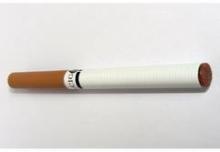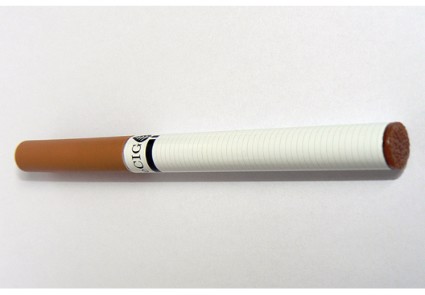User login
Stating that e-cigarettes are a gateway to tobacco addiction for young people, almost a dozen members of Congress are urging the Food and Drug Administration to immediately begin regulating the sale and marketing of the products to children.
The 11 Democratic lawmakers from the House and the Senate issued a report that they say shows that e-cigarette makers are using the same tactics once used by tobacco manufacturers – but now prohibited – to lure young people into using the nicotine-infused devices.
"E-cigarettes are a candy-flavored addiction, which is dangerous to our young people," said Sen. Dick Durbin (D-Ill.) in a briefing with reporters. He said that the report, which is based on data submitted to Congress by nine e-cigarette manufacturers, contains evidence that the companies are making what he called a "determined effort" to attract young users.
The Democratic members of Congress surveyed the manufacturers in the wake of a report from the Centers for Disease Control and Prevention that showed that, from 2011 to 2012, the percentage of high school students who had used e-cigarettes more than doubled, from 4.7% to 10%.
The marketing practices used by the companies include using social media like Facebook and Twitter to reach youths and adolescents, sponsorships of youth-oriented events like music festivals and handing out free samples at the events, and radio and television ads played during events and programs with significant youth viewership. In 2012 and 2013, six of the companies sponsored or provided free samples at 348 events. Also, six e-cigarette makers market e-cigarettes in flavors that might appeal to young people, including Cherry Crush, Chocolate Treat, Peachy Keen, and Grape Mint.
"It’s time for the FDA to step up and regulate this product," said Sen. Durbin.
He said that the FDA currently has the authority to "deem" e-cigarettes similar to conventional tobacco products, and thus apply the rules that govern marketing of those products to the electronic products. The senator also said that absent FDA action, there was not enough support in the House and Senate to pass a new law specifically aimed at the e-cigarette industry. "I’m a realist, and the likelihood of revisiting this whole issue of FDA authority is not very strong," said Sen. Durbin.
"The report we are issuing today should be the prod to act," Rep. Henry Waxman (D-Calif.) told reporters. Rep. Waxman is one of the lawmakers who have called for tougher regulations.
Both Sen. Durbin and Rep. Waxman said that they believed that e-cigarettes have the potential to be addictive for young people, and called it a gateway to the use of tobacco products. But Rep. Waxman also said he believed that the FDA needs to study e-cigarettes. "We don’t really know the benefit," he said. "All we have are claims of benefits. But we are seeing the risks very clearly," said Rep. Waxman.
The Democratic lawmakers are recommending that:
• The FDA issue regulations that deem e-cigarettes the same as other tobacco products, and prohibit sales to minors under age 18.
• Companies prohibit sales to youth under age 18.
• The FDA should ban sales tactics that may be attractive to children and teens, such as the use of flavors that appeal to them, distributing free samples of e-cigarettes, and product promotion through social media, sponsorship of events, and other activities that are intended for a youth audience. Manufacturers should also agree to stop such activities.
• Manufacturers refrain from the use of television and radio ads.
• The FDA should require strong, uniform labels to inform consumers of health risks and should prohibit misleading product claims.
The Democratic lawmakers requested information from the following e-cigarette makers: NJOY, Lorillard, Reynolds American, Altria Group, LOGIC, EonSmoke, Green Smoke, VMR Products, and Lead By Sales. Of these, only Lead by Sales, which makes White Cloud Cigarettes, did not respond.
Six of the companies said they support some form of regulation, including restrictions on the marketing and sale of e-cigarettes to children and teens.
On Twitter @aliciaault
Stating that e-cigarettes are a gateway to tobacco addiction for young people, almost a dozen members of Congress are urging the Food and Drug Administration to immediately begin regulating the sale and marketing of the products to children.
The 11 Democratic lawmakers from the House and the Senate issued a report that they say shows that e-cigarette makers are using the same tactics once used by tobacco manufacturers – but now prohibited – to lure young people into using the nicotine-infused devices.
"E-cigarettes are a candy-flavored addiction, which is dangerous to our young people," said Sen. Dick Durbin (D-Ill.) in a briefing with reporters. He said that the report, which is based on data submitted to Congress by nine e-cigarette manufacturers, contains evidence that the companies are making what he called a "determined effort" to attract young users.
The Democratic members of Congress surveyed the manufacturers in the wake of a report from the Centers for Disease Control and Prevention that showed that, from 2011 to 2012, the percentage of high school students who had used e-cigarettes more than doubled, from 4.7% to 10%.
The marketing practices used by the companies include using social media like Facebook and Twitter to reach youths and adolescents, sponsorships of youth-oriented events like music festivals and handing out free samples at the events, and radio and television ads played during events and programs with significant youth viewership. In 2012 and 2013, six of the companies sponsored or provided free samples at 348 events. Also, six e-cigarette makers market e-cigarettes in flavors that might appeal to young people, including Cherry Crush, Chocolate Treat, Peachy Keen, and Grape Mint.
"It’s time for the FDA to step up and regulate this product," said Sen. Durbin.
He said that the FDA currently has the authority to "deem" e-cigarettes similar to conventional tobacco products, and thus apply the rules that govern marketing of those products to the electronic products. The senator also said that absent FDA action, there was not enough support in the House and Senate to pass a new law specifically aimed at the e-cigarette industry. "I’m a realist, and the likelihood of revisiting this whole issue of FDA authority is not very strong," said Sen. Durbin.
"The report we are issuing today should be the prod to act," Rep. Henry Waxman (D-Calif.) told reporters. Rep. Waxman is one of the lawmakers who have called for tougher regulations.
Both Sen. Durbin and Rep. Waxman said that they believed that e-cigarettes have the potential to be addictive for young people, and called it a gateway to the use of tobacco products. But Rep. Waxman also said he believed that the FDA needs to study e-cigarettes. "We don’t really know the benefit," he said. "All we have are claims of benefits. But we are seeing the risks very clearly," said Rep. Waxman.
The Democratic lawmakers are recommending that:
• The FDA issue regulations that deem e-cigarettes the same as other tobacco products, and prohibit sales to minors under age 18.
• Companies prohibit sales to youth under age 18.
• The FDA should ban sales tactics that may be attractive to children and teens, such as the use of flavors that appeal to them, distributing free samples of e-cigarettes, and product promotion through social media, sponsorship of events, and other activities that are intended for a youth audience. Manufacturers should also agree to stop such activities.
• Manufacturers refrain from the use of television and radio ads.
• The FDA should require strong, uniform labels to inform consumers of health risks and should prohibit misleading product claims.
The Democratic lawmakers requested information from the following e-cigarette makers: NJOY, Lorillard, Reynolds American, Altria Group, LOGIC, EonSmoke, Green Smoke, VMR Products, and Lead By Sales. Of these, only Lead by Sales, which makes White Cloud Cigarettes, did not respond.
Six of the companies said they support some form of regulation, including restrictions on the marketing and sale of e-cigarettes to children and teens.
On Twitter @aliciaault
Stating that e-cigarettes are a gateway to tobacco addiction for young people, almost a dozen members of Congress are urging the Food and Drug Administration to immediately begin regulating the sale and marketing of the products to children.
The 11 Democratic lawmakers from the House and the Senate issued a report that they say shows that e-cigarette makers are using the same tactics once used by tobacco manufacturers – but now prohibited – to lure young people into using the nicotine-infused devices.
"E-cigarettes are a candy-flavored addiction, which is dangerous to our young people," said Sen. Dick Durbin (D-Ill.) in a briefing with reporters. He said that the report, which is based on data submitted to Congress by nine e-cigarette manufacturers, contains evidence that the companies are making what he called a "determined effort" to attract young users.
The Democratic members of Congress surveyed the manufacturers in the wake of a report from the Centers for Disease Control and Prevention that showed that, from 2011 to 2012, the percentage of high school students who had used e-cigarettes more than doubled, from 4.7% to 10%.
The marketing practices used by the companies include using social media like Facebook and Twitter to reach youths and adolescents, sponsorships of youth-oriented events like music festivals and handing out free samples at the events, and radio and television ads played during events and programs with significant youth viewership. In 2012 and 2013, six of the companies sponsored or provided free samples at 348 events. Also, six e-cigarette makers market e-cigarettes in flavors that might appeal to young people, including Cherry Crush, Chocolate Treat, Peachy Keen, and Grape Mint.
"It’s time for the FDA to step up and regulate this product," said Sen. Durbin.
He said that the FDA currently has the authority to "deem" e-cigarettes similar to conventional tobacco products, and thus apply the rules that govern marketing of those products to the electronic products. The senator also said that absent FDA action, there was not enough support in the House and Senate to pass a new law specifically aimed at the e-cigarette industry. "I’m a realist, and the likelihood of revisiting this whole issue of FDA authority is not very strong," said Sen. Durbin.
"The report we are issuing today should be the prod to act," Rep. Henry Waxman (D-Calif.) told reporters. Rep. Waxman is one of the lawmakers who have called for tougher regulations.
Both Sen. Durbin and Rep. Waxman said that they believed that e-cigarettes have the potential to be addictive for young people, and called it a gateway to the use of tobacco products. But Rep. Waxman also said he believed that the FDA needs to study e-cigarettes. "We don’t really know the benefit," he said. "All we have are claims of benefits. But we are seeing the risks very clearly," said Rep. Waxman.
The Democratic lawmakers are recommending that:
• The FDA issue regulations that deem e-cigarettes the same as other tobacco products, and prohibit sales to minors under age 18.
• Companies prohibit sales to youth under age 18.
• The FDA should ban sales tactics that may be attractive to children and teens, such as the use of flavors that appeal to them, distributing free samples of e-cigarettes, and product promotion through social media, sponsorship of events, and other activities that are intended for a youth audience. Manufacturers should also agree to stop such activities.
• Manufacturers refrain from the use of television and radio ads.
• The FDA should require strong, uniform labels to inform consumers of health risks and should prohibit misleading product claims.
The Democratic lawmakers requested information from the following e-cigarette makers: NJOY, Lorillard, Reynolds American, Altria Group, LOGIC, EonSmoke, Green Smoke, VMR Products, and Lead By Sales. Of these, only Lead by Sales, which makes White Cloud Cigarettes, did not respond.
Six of the companies said they support some form of regulation, including restrictions on the marketing and sale of e-cigarettes to children and teens.
On Twitter @aliciaault

